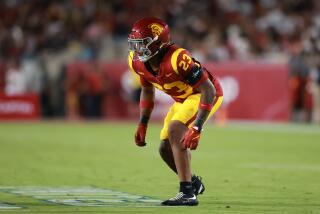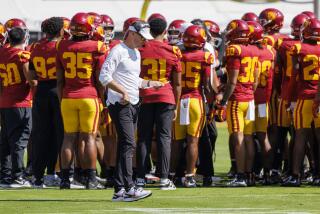His Reward for Big Return: Big Promotion : College football: USC’s Harrison joins starting lineup after returning an interception for a touchdown.
For Quincy Harrison, the transition from offense to defense was moving along briskly.
In USC’s season-opening victory over Washington, the new cornerback was in for six plays.
No major foul-ups, no muffed assignments. Promising start.
Then, two Saturdays ago at Penn State, Harrison was in for 16 plays.
Here’s how one of them went:
USC is on its way to being shut out early in the third quarter. It’s 35-0 when Penn State quarterback Kerry Collins calls a pass play to his left--against the cornerback the Nittany Lion coaches knew was new to the position.
“I saw his eyes,” Harrison said. “He looked right at me.
“Just before the snap, I heard Scott Fields, our free safety, yell at me, ‘It’s comin’ to our side! It’s comin’ to our side!’
“Then Collins looked at me and I knew he was right.”
Collins, behind perfect pass protection, threw a soft pass to Chris Campbell. At its apex, the ball looked like a beach ball to Harrison. He closed rapidly on the intended receiver, caught the ball with both hands in front of the Penn State bench and kept on going, 68 yards, to the end zone.
On his way, Harrison ran so fast, the official trying to keep up with the play suffered a pulled hamstring and had to leave the game.
And that one play clinched a promotion. Shortly afterward, Coach John Robinson announced that Harrison was USC’s new starting right cornerback.
In one 68-yard play, he had gone from an invisible wide receiver to a starter on the other side of the ball. A 5-foot-11, 185-pound redshirt sophomore, Harrison was one of the last players recruited by the pre-Robinson USC coaching regime.
A wide receiver and sprinter at Eldorado High in Las Vegas, Harrison was on his way to Washington when USC assistant Wayne Nunnely intervened.
“I was planning on going to Washington, but when USC came in late and showed a lot of interest in me, well, I really wanted to play at USC. And it’s closer to home than Washington,” Harrison said.
But Harrison was somewhat adrift in the USC football program. Last season he played in a wide receiver corps led by Johnnie Morton, appearing in only one game, against Oregon State, and catching no passes.
“It was clear to me Quincy didn’t figure in the offense’s plans and I wanted to see how he’d play as a cornerback,” said Dennis Thurman, who coaches the Trojans’ cornerbacks.
The transition began last spring.
“The coaches had been hinting around about me moving to defense, so before spring practice, I talked to (offensive coordinator) Don Lindsey and Dennis Thurman,” Harrison said.
And he showed the right stuff last spring.
“For a defensive player, Quincy does some things very naturally,” Thurman said.
“For one thing, he’s a natural tackler. He wraps a guy up immediately. He got a lot of good work done last spring on his backpedal and shuffle. He’s a quick learner.”
Said Harrison: “Coach Thurman is pretty tough on us in practice when we’re not consistent.”
“He’s very big on consistency--learning how to do something right, and then to keep doing it that way.
“He’s made me feel welcome on defense, and I appreciate that. The way I feel now, I wouldn’t go back to wide receiver. It didn’t take me long to figure out it’s more fun to hit than to get hit.”
Among the most excited TV viewers of Harrison’s interception return at Penn State were his old coaches at Eldorado High, where Harrison is remembered as a big-play wide receiver.
In his senior season, he caught five passes for more than 60 yards.
“Everyone on campus was talking about it the next day,” said Jimmy May, Eldorado’s coach.
“He was the best athlete in the school and a great kid. His senior year, he played on the only state championship team we’ve had in 23 years. Quincy and three other players from that team got four-year scholarships.”
An assistant coach at Eldorado, Tom Farnsworth, remembers Harrison as an athlete with a high level of motivation.
“He was a very good basketball player here, but when he decided his future was in football, he dropped out of basketball after his sophomore season and spent the next two basketball seasons in the weight room,” he said.
So, what’s it like to make a big defensive play before 96,000?
“I really wasn’t conscious of the crowd or anything,” he said. “I was just making sure I stayed in bounds. It would’ve been nicer if we’d won too.”
More to Read
Go beyond the scoreboard
Get the latest on L.A.'s teams in the daily Sports Report newsletter.
You may occasionally receive promotional content from the Los Angeles Times.






